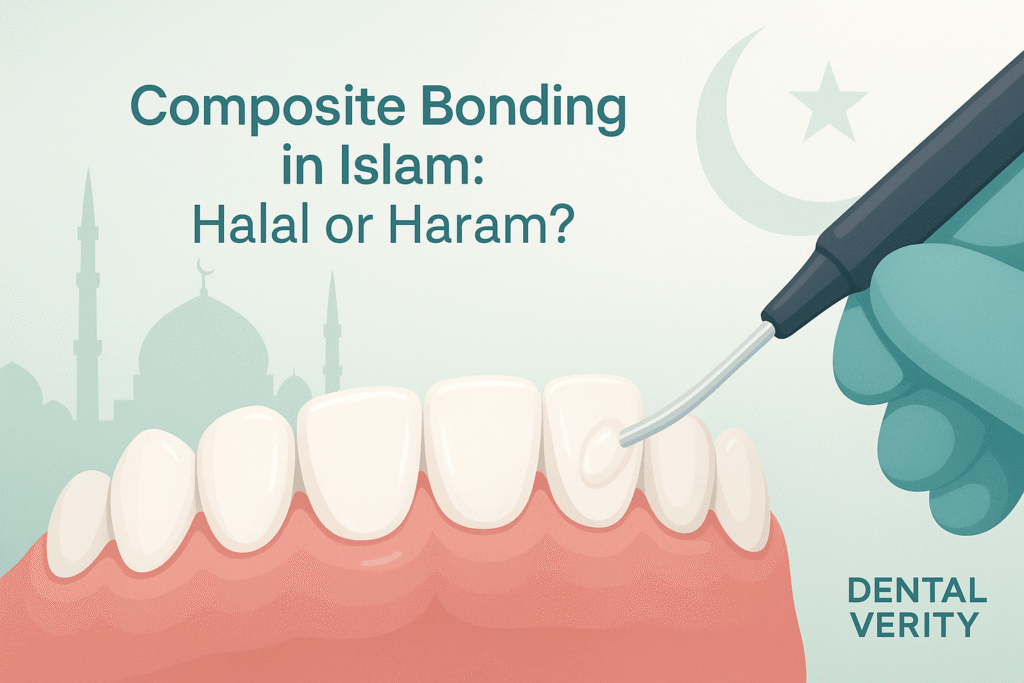
It’s common in the Muslim community to ask whether composite bonding is halal or haram. The concept of what is Halal and what is Haram guides Muslims when they decide on important decisions about what’s permissible or not permissible in their daily lives. I’ve seen many a Muslim looking into composite bonding and other dental treatments, hoping for a clear post or answer to this important question so they can make the right decision concerning teeth health.
These days, composite bonding has become a popular cosmetic dental procedure, helping individuals achieve a more beautiful smile. But for a devout Muslim, there can be concerns about the religious permissibility of such treatments. This blog aims to explore the question of whether composite bonding is haram, looking at Islamic perspectives and rulings around the issue. The goal is to find if composite bonding aligns with Islamic teachings and beliefs.
After all, about 70% of people say they’re unhappy with their smiles. If you’re considering composite bonding but still unsure whether it’s haram under Islamic principles, this article will delve into the Islamic perspective on body alterations. We’ll also explore scholarly opinions and cultural views, giving you space to make an informed decision while deepening your understanding of what is Halal, what is Haram, and where cosmetic procedures truly fit.
Halal and Haram – Understanding the Basics
When talking about composite bonding, many wonder if it’s halal or haram, so it’s important to be clear on these terms and what they mean. Halal is an Arabic word that translates to permissible or lawful in the English language. It’s not limited to foods a Muslim can or cannot eat, but is applicable to everything in life — from food to how Muslims use daily things. Haram, the opposite, means forbidden or unlawful, and it applies to actions and choices that a Muslim should avoid.
To grasp the deeper implications, we need to see how Islamic law and principles shape these Arabic terms. They are tied not only to dietary laws, but also to ethical codes that keep guiding Muslims in their daily lives. While Halal highlights what’s permissible, its interpretations may vary, the Quran allows some foods and marks others as haram, and these interpretations extend into every aspect of life, from business transactions to personal grooming. Yet, Haram misconceptions exist, often misconstrued as just “sinful,” though it actually covers prohibited actions, items, and practices. Because of different cultural contexts, rulings can differ, making it vital to build an understanding of these religious obligations. So, when asking if composite bonding is haram, the answer depends on the complexities of Islamic jurisprudence, its application in modern times, and the intent behind the choice.
Getting to Know Composite Bonding
If you’ve ever felt a bit self-conscious about the appearance of your teeth—maybe small chips, cracks, or even gaps—then composite bonding might sound like the right solution. It’s a popular dental treatment where a dentist uses a straightforward process of applying tooth-coloured composite resin onto the teeth. The resin is shaped, polished, and blended to match the natural colour and contour, creating a beautiful, almost seamless coating that can really improve your smile.
The technique itself is quite simple: the dentist first prepares the tooth by gently roughening the surface, then a conditioning liquid is applied so the bonding material can adhere better. After that, the resin is moulded and smoothed into the right shape, giving it a natural look. A special light is used to harden it, followed by trimming, shaping, and polishing until it matches the sheen of your other teeth. The whole process usually takes about 30 to 60 minutes per tooth, making it a quick fix for minor imperfections like chips, cracks, or discoloration.
What I find impressive is how cost-effective and less invasive it is compared to veneers or other procedures. There’s usually only minimal removal of enamel, so it feels like a gentler alternative. The durable material—a mixture of plastic and glass with a resin-based matrix like bisphenol A-glycidyl methacrylate and inorganic filler silica—is strong enough to last for years with good oral hygiene. Not only does it enhance and protect against further damage, but it’s also great for repairing small cavities or stained teeth, restoring smiles, and even boosting confidence with a subtle yet remarkable transformation in overall facial aesthetics.
So, Is Composite Bonding Halal or Haram?
It really depends on the reason for getting composite bonding. If it’s to fix a health defect like straightening crooked or unaligned teeth, many scholars say it’s permitted and even Halal, since the procedure is seen as permissible in Islam. As long as no Haram ingredients are included in the composite resin—and studies so far show none are—then it falls within what’s allowed. Some people do argue it might be haram if it seems to prevent water from reaching teeth during ghusl, ritual bath, or ablution (wudu), which could make cleansing unacceptable. But scholars also note that if a body part is covered out of need, the act is still valid and acceptable.
From another angle, composite bonding is considered permissible in Islam if certain conditions are met: it must be safe, not cause harm, and avoid changing the structure or function of the tooth beyond what’s necessary. Since it mostly improves appearance and helps with dental issues rather than only for beautification purposes, it can be halal. With no harmful side effects reported when done properly, and with qualified professionals who follow safety standards, dentists can perform procedures using safe materials and techniques that don’t pose risks to overall health.
Exploring Islam’s Perspective on Cosmetic Dental Treatments
Beautification in Islam – A Positive Approach
Beautification is encouraged in Islam, as caring for one’s appearance is a way of thanking Allah for His blessings. As human beings, we have a natural inclination toward beauty, and keeping up with it can even be seen as a form of worship when we maintain our physical appearance responsibly. The key is balance, avoiding doing it excessively or at the expense of our health.
Cosmetic Dental Care in Islam
Cosmetic dental procedures in Islam are generally allowed as long as they don’t cause harm to a person’s health. The Prophet Muhammad (peace and blessings be upon him) even reminded us that Allah loves to see His servant take care of their appearance. That’s why treatments like composite bonding, a cosmetic dental procedure using tooth-coloured resin material to improve the look of teeth, are seen as acceptable when they are safe and help repair chipped, cracked teeth, close gaps, or enhance shape and colour naturally.
Composite Bonding: Scholarly Views and Perspectives
Scholars have shared differing opinions on procedures like composite bonding, with some calling it haram while others see room for acceptance. This variance in views often comes from the interpretation of Islamic principles about body modification and using artificial substances. Since composite bonding is a popular dental method to improve aesthetics with resin for the appearance of teeth, many in the Islamic community question its transformative nature. Some believe that if the intention is to solve a dental problem rather than for pure cosmetic purposes, it may not fall into the category of haram.
Others argue that altering the body’s natural state for medical reasons could still be seen as haram, since our bodies are a trust from Allah and should be preserved. A more moderate view suggests that minor modification for oral health can be permissible, depending on context and intent. Because it’s a complex issue, seeking guidance from a knowledgeable source is always wise, especially when navigating between interpretation, faith, and modern bonding techniques.
Composite Bonding Through Different Cultural Lenses
When it comes to cultural perspectives, the acceptance of composite bonding can really vary depending on where you are. In Western societies, this dental procedure is widely accepted because of its clear bonding benefits like being minimally invasive, its affordability, and the effectiveness in improving a smile, which explains its popularity. In Asian cultures, especially in places like South Korea and Japan, such aesthetic procedures are highly valued, though they may be less prevalent in less developed regions where access to dental care is limited.
Meanwhile, Middle Eastern contexts show a more mixed stance. While there’s no strict prohibition in Islam, the idea of altering the body is often debated, leading to different levels of acceptance. In African cultures, you’ll see both ends of the spectrum—urbanised areas leaning toward the advantages of bonding, while more rural communities may hold onto traditional beliefs that discourage it. Wherever one stands, it’s important to show respect for these cultural views, while also considering the potential benefits of the treatment.
Frequently Asked Questions
1. What is composite bonding and why do people choose it?
Composite bonding is a dental procedure where a tooth-coloured resin is applied to teeth to fix issues like chips, cracks, gaps, or discoloration. People often choose it because it’s minimally invasive, affordable, and improves the overall appearance of their smile.
2. Is composite bonding considered halal in Islam?
In general, it can be halal if it’s done for a health reason, such as fixing a defect or restoring damaged teeth. Scholars usually consider it permissible as long as no haram ingredients are used and the intention is not purely for excessive beautification.
3. Why do some scholars argue that composite bonding may be haram?
Some argue it could be haram because the resin material might prevent water from reaching the teeth during wudu or ghusl. However, many scholars clarify that if a body part is covered due to need, the cleansing is still valid.
4. Are cosmetic dental procedures like composite bonding safe?
Yes, when performed by qualified dentists using safe materials and proper techniques, it’s considered a safe procedure. With good oral hygiene, composite bonding can last for several years and also protect teeth from further damage.
5. How do cultural views on composite bonding differ?
Cultural perspectives vary: in Western societies, it’s widely accepted due to its benefits; in Asian cultures like South Korea and Japan, it’s highly valued; in the Middle East, views are mixed because of debates about altering the body in Islam; and in many African cultures, acceptance depends on whether the community is more urbanised or traditional.
Conclusion
The discussion around composite bonding touches both perception and faith. For many, it brings hope, while for others it feels like a challenge to divine design in Islam. Deciding if it is haram or halal isn’t just black and white—it sits within a spectrum of scholarly interpretations and cultural beliefs that shape how people view it.
What matters is approaching the subject carefully, with respecting hearts and an understanding of the nuances involved. In the end, it’s your smile, your choice, and your path—one that should leave you more enlightened and aware of both faith and personal wellbeing.



